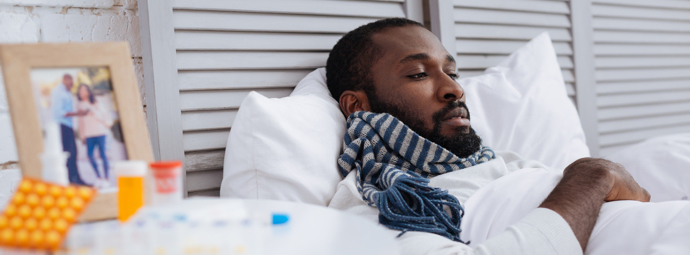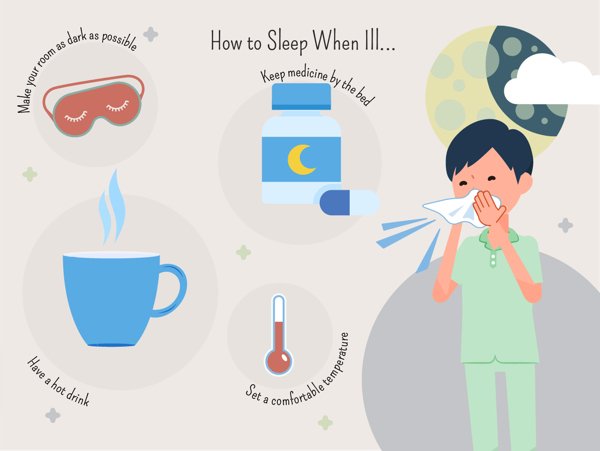
For some of us, getting enough sleep can be a struggle. And when you throw feeling under the weather into the mix, the whole idea of a solid eight hours can sometimes go straight out the window. Thankfully, we’ve created a handy guide on getting enough sleep when you’re poorly.
But first, why is it so important?
Why is sleep important (especially when ill)
According to the NHS, sleep is important for many reasons, including to de-stress, give your brain time to recover, to give you energy and to boost your immune system.
Many of us have experienced the occasional sleepless night and woken up in a bad mood with no energy or motivation, spending the day at work counting down the minutes until you can jump back into bed. Although it’s not always possible, it is advised that you need around 8 hours of good quality sleep to feel refreshed in the morning.
The National Heart, Lung, and Blood Institute states that while you sleep, your body is working to support healthy brain function and maintain your physical health. Without sleep then, it’s clear to see why everyday tasks may seem impossible!
Understanding why sleep is important to your general health, goes someway in explaining why it’s an absolutely essential part of recovering from illness. Even a small loss of sleep has been shown to impair immune function, making you more susceptible to illness and making it harder for your body to fight off infections.
How to sleep when ill
Sleep is integral to your health and is even more important when you are feeling under the weather - plenty rests enables your body to fully recuperate.
You may feel restless and uncomfortable, or you may have a banging headache which is preventing you from switching off. Either way, when you’re completely exhausted, the last thing you need is to be up all night tossing and turning. This will result in you feeling even worse in the morning – no one has time for that!
In order for your immune system to mend itself, securing a good night's sleep is crucial. According to The Sleep Council, your bedroom setting is the key ingredient to a great night's sleep. Fresh sheets and a clutter free bedroom are an attractive sight for any sleep lover, even more so when you’re poorly and drained.
Try to make sure your room is as dark as possible. If you aren’t lucky enough to have some blackout blinds, an eye mask should do the trick. Blocking out light should ensure a lengthy, undisturbed sleep which many of us face as the mornings get lighter or if you’ve managed to get an early night.
Some other things to remember when working out how to sleep when ill are:
- Try to maintain a comfortable temperature. Being too hot or too cold will affect your sleep and if you have a fever this is maximised. Keeping a fan handy could prevent you from overheating. Likewise if you’re shivery, keep warm with a nice blanket and a hot water bottle.
- Lavender is often recommended by sleep specialists to make you feel calm and relaxed.
- Keep tablets and a drink to hand on your bedside to relieve any uncomfortable symptoms and alleviate any pain

How to sleep with a cold, cough or fever
Ever wondered why cold, cough or fever symptoms always seem to worsen once you get into bed? When speaking to Web MD, Dr Ron Eccles, Director of the Common Cold Centre at Cardiff University says “Its related to posture”, and explains how lying down can increase the pressure in the veins in your nose. He goes on to say that this pressure build up is what causes you to feel more blocked up than when you're standing.
That said, it’s advised to add an extra pillow and prop them up before going to sleep, as this will open the air passages, relieving sinus pressure, and make it slightly easier to breathe without suffering with the congestion.
Consuming hot drinks and soups are also advised when suffering with a cold, cough or fever, as the steam can help to relieve congestion, not forgetting keeping you hydrated at the same time which is important – try to have a hot drink before bed to encourage a peaceful sleep.
Likewise, a hot, steamy shower can help to clear your airways.
Before you go to bed, prepare your bedside with anything you may need in the night to prevent you needing to venture into a different room mid-rest. A glass of water and cough medicine are a must when suffering with a nasty cough. Decongestant sprays, lozenges and nasal strips are also cold must-haves!
It may be worth buying a humidifier to run at night, these work by releasing moisture into the air. This can help by assisting your breathing and easing nose and throat pain, both of which are disruptive when trying to sleep with a cold.
As illnesses can leave us with a fluctuating temperature. Try not to wear too many clothes to bed and keep the room at a comfortable temperature – it’s important to make sure that fresh air is circulating the room too – using a fan can be a lifesaver when sleeping with a cold, cough or fever!
Sleeping when you’re ill can be incredibly challenging, but it is essential to your recovery. If you’re struggling with how to get to sleep or if you’re experiencing any pain and need to know how to sleep when injured, here at Time4Sleep we’re committed to helping you get the best sleep possible.



